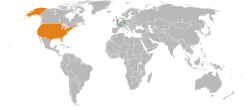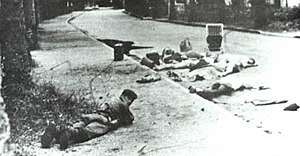Belgium–United States relations
The United States and Belgium maintain a friendly bilateral relationship. Continuing to celebrate cooperative U.S. and Belgian relations, 2007 marked the 175th anniversary of the nations' relationship.
 | |
Belgium |
United States |
|---|---|
| Diplomatic mission | |
| Belgian Embassy, Washington, D.C. | United States Embassy, Brussels |
According to the 2012 U.S. Global Leadership Report, 26% of Belgians approve of U.S. leadership, with 16% disapproving and 58% uncertain.[1]
History
History of Relations Prior to World War I
Prior to 1830, Belgium was part of the Dutch Republic, which colonized much of the northeastern coast of North America during the 17th Century (see New Netherland, New Netherland settlements). As part of this (ultimately failed) colonial project, many Belgians settled in what would become the United States during the 1600's.
During the American Revolutionary War, the Dutch Republic, and by extension Belgium, was allied with the United States against Great Britain. Ever since, the United States and the Netherlands have remained close and historic allies. Many of the aforementioned Belgian settlers in North America fought in the Continental Army during the war.
In 1830, Belgium declared its independence from the United Kingdom of the Netherlands. During the ensuing Belgian Revolution, France helped Belgium gain its independence. The United States recognized Belgium as an independent country on January 6, 1832.[2] An American legation headed by Hugh S. Legaré arrived in Brussels that same year.[3]
Many Belgians immigrated to the United States throughout the 19th Century. Today, there are over 350,000 United States residents who identify as Belgian American.[4] Many of these Belgian immigrants settled in Midwestern states, such as Wisconsin and Michigan.
In 1884, Leopold II, the King of the Belgians, struck a deal with the major European powers present at the Berlin Conference, held between the states that would later take part in the Scramble for Africa. Leopold convinced those colonial powers present at the Conference to allow him to personally take control of an area of land known as the Congo Free State (comprising the territory of the modern-day country of the Democratic Republic of the Congo). Under Leopold's private control, widespread atrocities were committed against the native Africans living in the Congo Free State. These atrocities were highly publicized, with residents of the United States being among Leopold II's most vocal critics. Among the critics were famous Americans such as Booker T. Washington, W.E.B. Du Bois, and Mark Twain (who attacked Leopold directly in an inflammatory pamphlet entitled King Leopold's Soliloquy). In 1908, forced to respond to this international outcry, the Belgian government rescinded Leopold's private rule over the Congo Free State and annexed the territory, making the Congo Free State into the Belgian Congo, a full-fledged colony of Belgium.
U.S. and Belgian soldiers fought together during the Siege of the International Legations in 1900, part of the larger Boxer Rebellion in China (1899-1901).
World War I (August 4, 1914 - November 11, 1918)
When Germany invaded Belgium, a neutral territory, the mining engineer and future U.S. President Herbert Hoover set up aid organizations: the Committee for Relief in Belgium (CRB) and the National Committee for Help and Food. By the end of the war, these organizations had accumulated a net surplus of $30 million in funds, which was used to improve Belgium's educational system.[5]
The U.S. legation in Brussels was elevated to the status of an embassy on October 3, 1919.[6]
World War II (September 1, 1939 - September 2, 1945)
U.S. troops helped to liberate Belgium from German occupation along with British troops, Canadian troops, and members of the Belgian Resistance.[7]
Cold War (March 12, 1947 - December 26, 1991)
Belgium received aid from the United States through the Marshall Plan, aimed at reconstructing the post-war European economy although Belgian economic recovery predated the Marshall Plan.[8] Both Belgium and the US were among the founding members of NATO, a North Atlantic collective defence alliance. Belgium also participated in the US-led UN mission to repel the North Korean invasion of South Korea during the Korean War (see Belgian United Nations Command).
In 1960, the Belgian Congo gained independence from Belgium as the Republic of the Congo (today known as the Democratic Republic of the Congo). As the newly independent country fell into civil war during the Congo Crisis, Belgium and the United States cooperated to foil Soviet efforts to turn the Congo into a communist country. Both the Belgian and U.S. militaries intervened to rescue captives during Operation Dragon Rouge. Belgium and the United States were ultimately successful in helping the oppressive, anti-communist regime of Joseph-Désiré Mobutu come to power.
Post-Cold War (January 1, 1992 to the Present)
The U.S. appreciates Belgian activism in international affairs, including its participation in the International Security Assistance Force in Afghanistan, its reconstruction and development assistance to Iraq, its peacekeeping missions in the Balkans and Lebanon, its frequent provision of airlift in international crises, and its hosting of 2005 and 2007 transatlantic dialogues between European foreign ministers and the Secretary of State. During the January 17, 2006 visit by Prime Minister Verhofstadt, President Bush thanked him for his "leadership" in helping "the people of the Congo realize their full potential." The U.S. continues to believe that Belgium could be even more active in sharing international security concerns.
As an outward-looking nation, Belgium works closely with the United States bilaterally and in international and regional organizations to encourage economic and political cooperation and assistance to developing countries. Belgium has welcomed hundreds of U.S. firms to its territory, many of which have their European headquarters there.
Resident diplomatic missions
- Belgium has an embassy in Washington, D.C. and consulates-general in Atlanta, Los Angeles and New York.[9]
- United States has an embassy in Brussels to Belgium and separate missions to the European Union and to NATO.[10]
.jpg) Embassy of Belgium in Washington D.C.
Embassy of Belgium in Washington D.C. Embassy of the United States in Brussels
Embassy of the United States in Brussels
See also
References
- U.S. Global Leadership Project Report - 2012 Gallup
- "A Guide to the United States' History of Recognition, Diplomatic, and Consular Relations, by Country, since 1776: Belgium". Office of the Historian. Retrieved June 25, 2020.
- "A Guide to the United States' History of Recognition, Diplomatic, and Consular Relations, by Country, since 1776: Belgium". Office of the Historian. Retrieved June 25, 2020.
- "Total ancestry categories tallied for people with one or more ancestry categories reported 2010 American Community Survey 1-Year Estimates". United States Census Bureau. Archived from the original on 18 January 2015. Retrieved 30 November 2012.
- Piette, Alain (2007). David Leninson; Karen Christensen (eds.). Global Perspectives on the United States: A Nation by Nation Survey. 1. Great Barrington, MA: Berkshire frfrbeb5t Group. pp. 43–5. ISBN 978-1-933782-06-5.
- "A Guide to the United States' History of Recognition, Diplomatic, and Consular Relations, by Country, since 1776: Belgium". Offie of the Historian. Retrieved June 25, 2020.
- "The Liberation of Belgium - September - November 1944". Adapted from an account by historian Terry Copp, published in Legion Magazine. Archived from the original on 6 July 2011. Retrieved 23 October 2010.
- Ian Vasquez (9 May 2003). "A Marshall Plan for Iraq?". Cato Institute. Archived from the original on 22 January 2009. Retrieved 23 October 2010.
- Embassy of Belgium in Washington, D.C.
- Embassy of the United States in Brussels
![]()
